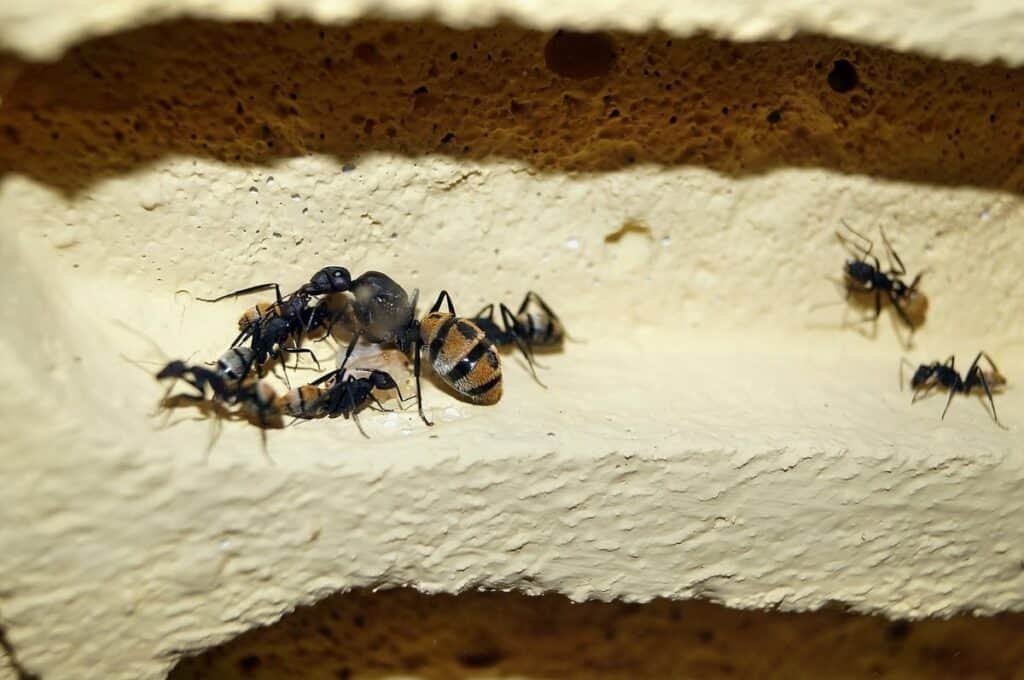An ant’s sleep is a complex process that has been studied extensively by biologists. By looking at their devotion to work, you might wonder if ants sleep or not. Well, here’s the answer:
Although ants are busy the whole day, they still need some time to rest. Ants are opportunistic sleepers and they don’t sleep as humans do. They take naps when they get a chance, often in between activities and not in their nests.
Many ants species such as carpenter ant or fire ant only take short naps between foraging trips unlike needing hours of sleep. It means that they can’t fulfill their sleep in just one time.
After a couple of minutes, they get up and repeat the process again to catch more food and bring it back home. Many ant species also show an increased activity immediately after waking themselves up.
It means that these ants are not really sleeping but rather getting ready for another round of work as soon as they got enough energy in their bodies.
How Do Ants Sleep?
Ants can be seen in two states: awake and asleep. When they are asleep, they will curl up on their sides with their legs tucked under them. This is called the “sleeping posture.” When ants are awake, they will extend their front legs out straight in front of them and move quickly about their nest or colony looking for food or fighting off predators.
When ants sleep, they do this in a round motion. The whole head, thorax, and abdomen will crumple down with the legs tucked under them so that they look like little bags of sozzled ants sprawled out on their sides.
When an ant colony is cold, they will experience conditions that inhibit their physical activity and cause them to fall asleep. This causes the workers to slow down or stop working altogether.
Despite this work slowdown, there are still a great number of ants committed enough to their duties to keep the community alive.
They are able to take care of certain tasks like foraging or guarding, making sure all that needs nurturing is fulfilled so their queen ant can continue growing and propagating more ants by feeding them better food sources when necessary.
How Much Do Ants Sleep?
Ants sleep around 253 times a day for very short intervals. The length of an ant nap depends on each individual type switching from very long relaxation to being extremely active. Queen ant’s sleeping episode duration is approximately 6 minutes while worker ants have sleep episodes of 1 minute.
The duration of sleep episodes does not vary significantly with the time of day.
This is way more than humans taking naps that’s for sure!
Ants need short power naps. This short and often irregular sleep is different from humans’ sleep patterns, but they need it to function properly and survive.
Ants need these breaks because they have such hectic lives and there are ants in the colony ready to take over if any fall asleep too much or get lazy.
Scientists have long known that ants are nocturnal organisms; however, their sleeping habits have not been well understood or studied until recently.
Do Queen Ants Get More Sleep Than Worker Ants?

At the very least, the queen ant needs to sleep for 9.4 hours per day and will remain active for 14.6 hours. They need a long, deeper sleep while worker ants sleep approximately 4.8 hours per day.
Workers do require ants to nap at different times of the day but they do not sleep as long while doing so.
Ants that are workers must sleep very little because of their demanding duties. They need to be alert, ready to handle any problems that may arise, and to be the first ones at work.
According to a research study by the University of South Florida, There are two types of queen sleep episodes in queen ants: ” deep sleep” and “dozing.”
Antennae, glossae, and mandibles of the queen were fully unresponsive to contact with workers. The folded antennae of queens frequently quivered in a “rapid antennal movement” (RAM) that could be an analog to the rapid eye movement (REM) in vertebrates during periods of heavy sleep.
Dozing differed from a deep sleep in that the antennae were partially stretched, with the scape and funiculi being at ninety-degree angles to each other, and the mandibles were partially open, but not overlapping.
Queens who doze are more likely to communicate and reply to workers or other queens with antennal movements.
Where Do Ants Sleep?
Ants sleep in the ant colony, the worker ants sleep in the queen bed and all of them are surrounded by the scout ants. This is done to peacefully protect themselves from potential enemies, such as birds or other insects.
The ants are able to synchronize their states while sleeping in a colony indicating that they have some degree of consciousness analogous with animals such as dolphins, orcas, and bats which also tend to be conscious during their inactive phases when taking naps.
Read more: 9 Reasons Why Ants Are Present in Your Room
